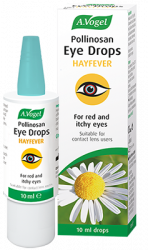An introduction to congestion and hayfever
Congestion occurs when the membranes lining the nasal passages become inflamed. This narrows the nasal passages making it more difficult to breathe. As your sense of smell is affected, your sense of taste will change. If nasal congestion affects your ears, you might find that they will feel ‘blocked’.
Hayfever can be a cause of nasal congestion. It occurs because the body’s immune system mistakes pollen for a threatening virus, and as a result produces excess mucus to trap the virus, triggering an allergic reaction.
What home remedies are there for nasal congestion?
Congestion is a common symptom of many conditions including hayfever, colds, flu and any infection of the upper respiratory tract. For this reason, there are many home remedies which have been used to ease this irritating symptom.
- Drink plenty of fluids such as water or tea as this helps to thin and loosen the excess mucus, easing the congestion. It also helps you to keep hydrated which will prevent further irritation to the back of your throat or nose. It is important not to drink anything which may dehydrate you, such as coffee or alcohol
- Inhale steam as this also helps to thin the mucus. You can do this by holding your head over a steaming bowl of water (but be careful not to burn yourself), by breathing in fumes from a cup of tea or bowl or soup. Having a hot steamy shower may also ease your congestion
- Some people find that covering their face with warm, slightly damp towels helps to clear their nasal passages, making it easier to breathe. If you are also suffering from sinus pain, you may find this helps to ease the pain
- Keep your head elevated as this helps to keep the mucus draining away in the correct direction. If you bend over, then the mucus will collect in the nasal passages rather than drain.
What about herbal remedies?
As the cause of your congestion is hayfever, then treating this should bring the most effective relief from your symptoms.
For example, Pollinosan Hayfever Tablets combine seven different herbs which help to target the body’s abnormal reaction to pollen. This will help not only to ease nasal congestion, but other symptoms associated with hayfever.
If you are looking for a herbal remedy specifically for nasal congestion, you may find that Pollinosan Luffa Nasal Spray brings you much needed relief. It reduces inflammation of the mucous lining of nasal passages, without breaking down the body’s natural protection.
Are there conventional medicines to help me?
Decongestants are available over-the-counter in the form of tablets or nasal sprays. They help to reduce sinus inflammation and pressure, allowing you to breathe more easily. Decongestants should not be used consecutively for more than three or four days as prolonged use often worsens congestion.
If your congestion is causing you to suffer from sinus pain, then you may find that painkillers help to relieve this symptom. Speak to your doctor or pharmacist to find a painkiller specifically for sinus pain.
However, decongestants and painkillers both ease the symptoms of congestion but do not target the hayfever at the root of the problem. A doctor or pharmacist is likely to suggest anti-histamines to reduce the body’s production of histamine in response to the pollen allergen. Some anti-histamines cause drowsiness so should not be taken if you are driving or working machinery.




 Looking for relief of red and itchy eyes due to hayfever?
Looking for relief of red and itchy eyes due to hayfever?

